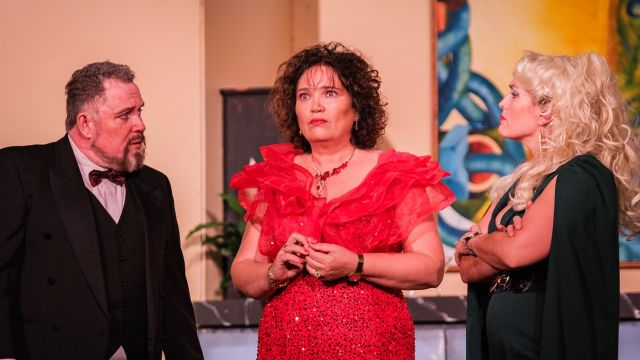Let’s Murder Marsha
THE PLAYING of farce is a difficult thing – many community theatre companies think it is an easy programme choice. It is anything but.
Farce requires much precision and the director needs to be aware of – amongst other things - the requisite physical comedy, comic timing and discipline. The actors need to create strong characterisations and be able to perform in a credible larger-than-life way as the absurdities of the plot unfold.
And to do this it can be boiled down to what I term the “ABCDEF” (or alphabet) of farce:-
· A: acting needs to be sharp and focused:
· B: business (as in stage business) needs to be detailed, clever and funny;
· C: cues need to be picked up with not a beat between lines;
· D: doors need to be used with a specific rhythm – one shuts literally as another opens;
· E: energy: it needs to be played with physical vigour from the moment the curtain goes up.
· F: fast: it needs to be played at lightning speed.
If you get all these right, then there is magic and hilarity. If not, the opposite is true.
This is a farce by an American playwright which in itself is unusual as this genre is traditionally the domain of British theatre. The play has all the bones of what could be light evening’s entertainment, but somehow this production did not seem to get there.
Taking on board the “farce alphabet” would have been a great starting-point, but this production was hindered from the beginning with a lack of pace and energy. This set the unfortunate tone for the performance and prevented the play from developing into the hilarious and light-hearted romp it should have been.

The plot is simple: a woman obsessed with reading murder mysteries overhears a conversation between her husband and another woman and assumes they are planning to murder her. In truth, it is a plan for her birthday celebration, and misunderstandings abound and compound as it finally unravels.
In the challenging central role as Marsha, Catherine McKernan Doris has an open and pleasing stage personality. She certainly makes a strong statement in a role that was clearly reminiscent of the part of “Clarissa” in Agatha Christie’s The Spider’s Web. She needed to imbue Marsha with similar capricious characteristics to give the character interesting development opportunities.
Lucy Gounaris as Bianca the maid and Christine Scott as the mother-in-law had their moments of fun, as did Melissa Donges-Curro as the erstwhile interior decorator.
Rick Dart as the husband needed to have the proverbial sparkle in his eye and a great deal more physical energy to have been convincing, while Stephen Duffie – in an unfortunate wig – made a good attempt as the hapless put-upon neighbour.
On the flip side, just as it was significant that the Townsville Little Theatre staged the last production at the old Pimpac Arts Centre, so it should stage the first at the impressive new Denise Glasgow Performing Arts Centre which doubles as a theatre and a hall designed for music.
Review by Trevor Keeling
Photographer: Martin Hodgson
Subscribe to our E-Newsletter, buy our latest print edition or find a Performing Arts book at Book Nook.

